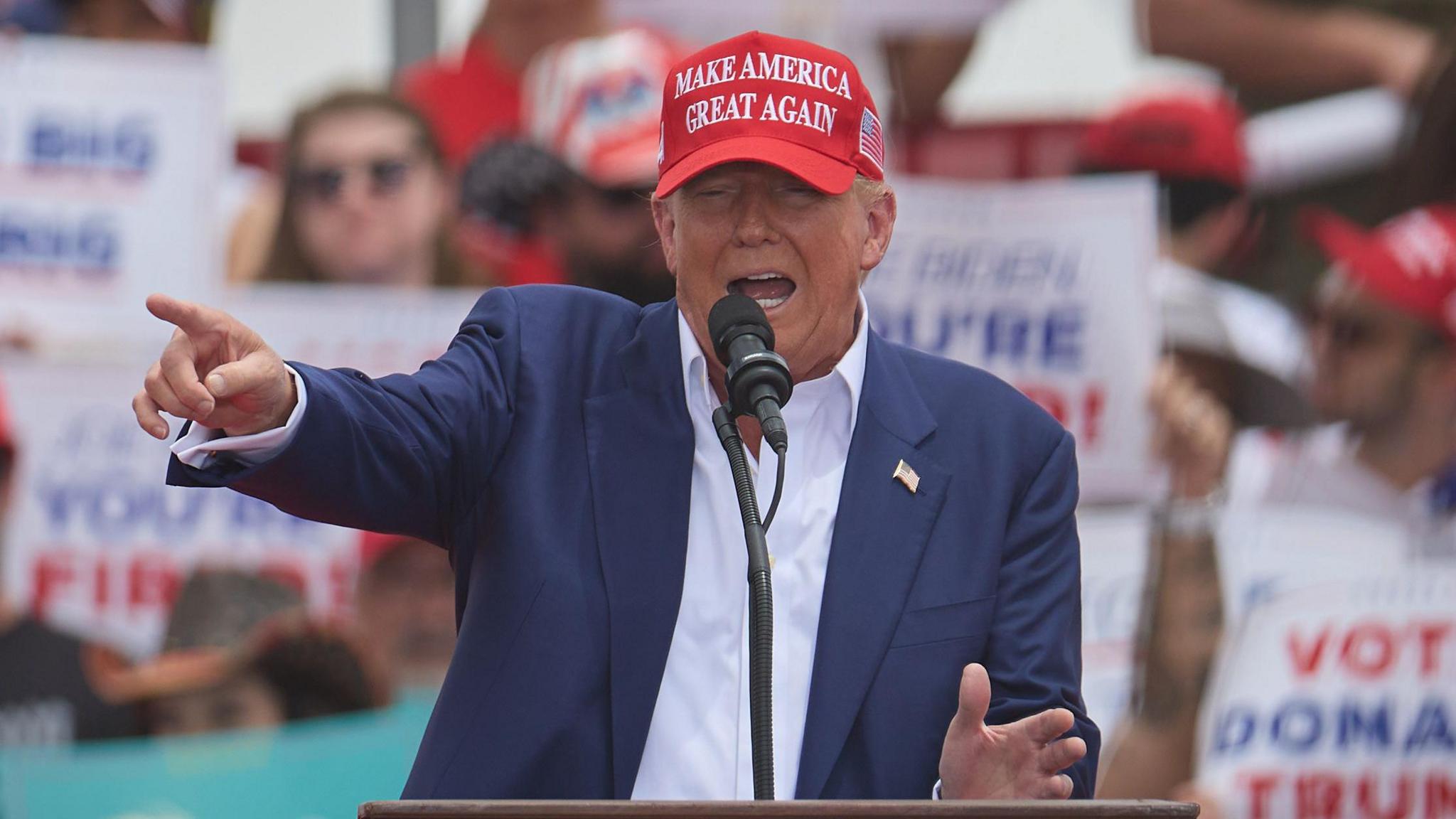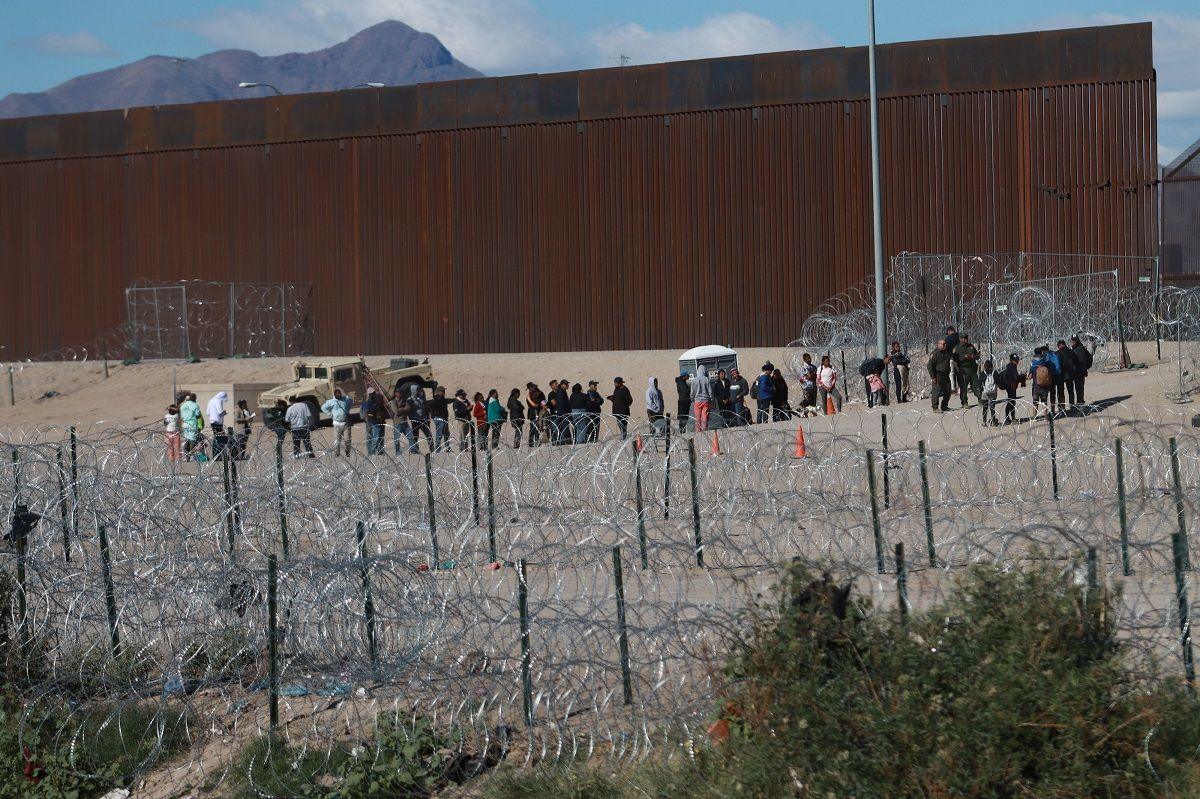Project 2025: The right-wing wish list for Trump's second term

- Published
It is a 900-page policy "wish list", a set of proposals that would expand presidential power and impose an ultra-conservative social vision.
During his campaign, Donald Trump repeatedly disavowed Project 2025, after a backlash over some of its more radical ideas.
But he has nominated several of its authors to fill key government positions, and many of his initial executive orders closely follow proposals outlined in the document.
Here's your guide to Project 2025, which lays out one vision of how Trump might govern over the next four years.
Where did Project 2025 come from?
Project 2025 is a product of the Heritage Foundation, one of Washington's most prominent right-wing think tanks. It first produced policy plans for future Republican administrations in 1981, when Ronald Reagan was about to take office.
It has produced similar documents in connection with subsequent presidential elections, including in 2016, when Trump first won the presidency.
That's not unusual - it's common for US think tanks of all political stripes to propose policy wish lists for future governments.
There's no denying Heritage has been influential during Republican presidencies. One year into Trump's first term, the think tank boasted that the White House had adopted nearly two-thirds of its proposals.
Its latest set of recommendations was unveiled in April 2023, but went largely unnoticed outside of policy circles until the heat of the presidential campaign, when Democratic opposition to the document ramped up.
Democratic politicians launched a "Stop Project 2025 Task Force" and even set up a tip line to collect insider information on Heritage's activities.
The Harris campaign and its surrogates consistently brought up the project in interviews and speeches.
Trump began actively pushing away from the document in July 2024.
"I know nothing about Project 2025," he posted on his social media platform, Truth Social. "I disagree with some of the things they're saying and some of the things they’re saying are absolutely ridiculous and abysmal."
The team that created the project was chock-full of former Trump advisers, including director Paul Dans, who was chief of staff at the Office of Personnel Management while Trump was president. Dans later left the project.
But other Project 2025 authors have been welcomed into government jobs.
Russell Vought, a self-described Christian nationalist, wrote a key chapter in the document and was confirmed by the Senate to lead the Office of Budget Management, which administers the $6.75tn (£5.44tn) federal budget.
Vought - who Democratic Senator Chuck Schumer called "the chief architect of Project 2025, its intellectual inspiration" - was also put in charge of the Consumer Financial Protection Bureau, external, an agency that the Trump administration has indicated it would like to close.
Other Project 2025 authors nominated to government positions include CIA director John Ratcliffe; Brendan Carr, chosen to oversee the Federal Communications Commission; Tom Homan, Trump's "border czar"; Paul Atkins, nominated to head the Securities and Exchange Commission; and trade advisor Peter Navarro.
More than 100 conservative organisations contributed to the document, Heritage says, including many that will now be hugely influential in Washington.
The document itself, external sets out four main policy aims: restore the family as the centrepiece of American life; dismantle the administrative state; defend the nation's sovereignty and borders; and secure God-given individual rights to live freely.
Some of the proposals have already formed the basis for Trump's executive orders - although in a number of cases they are also mentioned in other policy documents, including the Republican platform and Trump's Agenda47 campaign manifesto.
Government
Project 2025 proposes that the entire federal bureaucracy, including independent agencies such as the Department of Justice, be placed under direct presidential control - a controversial idea known as "unitary executive theory".
In practice, that would streamline decision-making, allowing the president to directly implement policies in a number of areas.
The proposals also call for eliminating job protections for thousands of government employees, who could then be replaced by political appointees.
The document labels the FBI a "bloated, arrogant, increasingly lawless organization". It calls for drastic overhauls of the agency and several others, as well as the complete elimination of the Department of Education.
Shortly after being sworn in, Trump moved to eliminate job protections for career civil servants, and freeze federal spending.
Through Elon Musk and the Department of Government Efficiency, the White House has moved to chop billions in federal spending, although the details and legal status of the cuts are hazy at best. DOGE is not an official government department, but rather an outside team advising Trump with broad authority from the president.
It's clear however that Trump intends to take a sledgehammer to the federal government as it currently stands - a goal broadly in line with Project 2025 suggestions.
Abortion and family
The mentions of abortion in Project 2025 - there are about 200 of them - have sparked some of the most contentious debate.
The document does not call for an outright nationwide abortion ban, and Trump says he would not sign such a law.
However, it proposes withdrawing the abortion pill mifepristone from the market, and using existing but little-enforced laws to stop the drug being sent through the post.
The document proposes new data collection efforts on abortion and more generally suggests that the department of Health and Human Services should "maintain a biblically based, social science-reinforced definition of marriage and family".
Trump, by contrast, has generally said that abortion laws should mostly be left to individual states.
However, during confirmation hearings, Trump's nominee for health secretary, Robert F Kennedy Jr, said the president had ordered him to examine the safety record of mifepristone and left open the possibility of further regulation of the drug.
Trump also issued an executive order designed to stop federal funds being used for abortion, a move that was outlined in detail in the Project 2025 document.
Immigration

Increased funding for a wall on the US-Mexico border - one of Trump's signature proposals in 2016 - is proposed in the document.
But Trump's signature immigration policy - a pledge to deport millions of undocumented immigrants - is not spelled out in any detail in Project 2025.
The document does include language calling on Trump to "thoroughly enforce immigration laws".
But in the main chapter dealing with immigration, Project 2025 authors suggest dismantling the Department of Homeland Security and combining it with other immigration enforcement units in other agencies, creating a much larger and more powerful border policing operation.
Other proposals include eliminating visa categories for crime and human trafficking victims, increasing fees on immigrants and allowing fast-tracked applications for migrants who pay a premium.
But it was mass deportations - not a bureaucratic shuffle, visa changes or a longer, taller border wall - that was Trump's top pitch to voters.
On this issue, his administration promises to go in a slightly different direction - and potentially much further - than the Project 2025 proposals.
Anthony Zurcher: Result hands Trump free rein
- Published6 November 2024
Energy, climate and trade
Energy policy is a broad area of agreement between Trump and the Project 2025 proposals, summed up by one of the president's campaign slogans: "Drill, baby, drill".
The new administration wants to ramp up fossil fuel production and has taken the US out of the Paris Agreement on climate change, which seeks to limit emissions and global warming.
Project 2025 proposes slashing federal money for research and investment in renewable energy, and calls for the next president to "stop the war on oil and natural gas" - ideas that the Trump campaign has enthusiastically taken up.
The document sets out two competing visions on tariffs: one suggesting boosting free trade and another pro-tariff position.
Trump has clearly sided with the latter camp, announcing import taxes targeting Canada, Mexico and China.
The economic advisers of Project 2025 suggest that a second Trump administration should slash corporate and income taxes, abolish the Federal Reserve and even consider a return to gold-backed currency.
While the president has made comments about proposals in some of these areas, the economic talk in the early days of his administration has been dominated by tariffs.
Education, tech and DEI
Almost immediately upon taking office, Trump moved to end diversity, equity and inclusion programs and decreed that government departments would recognise only two genders.
Those moves are broadly in line with Project 2025, which took aim at DEI and gender terminology as part of what it describes as a wider crackdown on "woke" ideology.
The document also calls for greater school choice - essentially subidising religious and private schools with public funds - which was also the subject of an early Trump executive order.
And it calls for abolishing the Department of Education, another idea that Trump has signalled he supports.
In other proposals, Project 2025 suggests banning pornography and shutting down tech and telecoms companies that allow access to adult material.
This has so far not been a focus of the new administration, which has drawn support from a number of top tech bosses.
Trump's views on the tech industry have regularly shifted, and don't appear to have much to do with sexual content.
The plan's uncertain future
The writing of Project 2025 was a massive undertaking, backed by a $22m (£17m) budget from Heritage.
It includes strategies for implementing policies, such as the creation of a database of conservative loyalists to fill government positions, and a programme to train those new workers.
There are clear areas of agreement and overlapping personnel. However, many of the themes of Project 2025 were independently being touted by the Trump campaign.
It's very early in Trump's second term, and still unclear how far the president will be able to go in reshaping the vast US federal government.
Democrats have indicated they will continue to oppose the proposals and highlight Project 2025's influence.
And many of the president's executive orders and other actions will continue to face political and legal challenges.